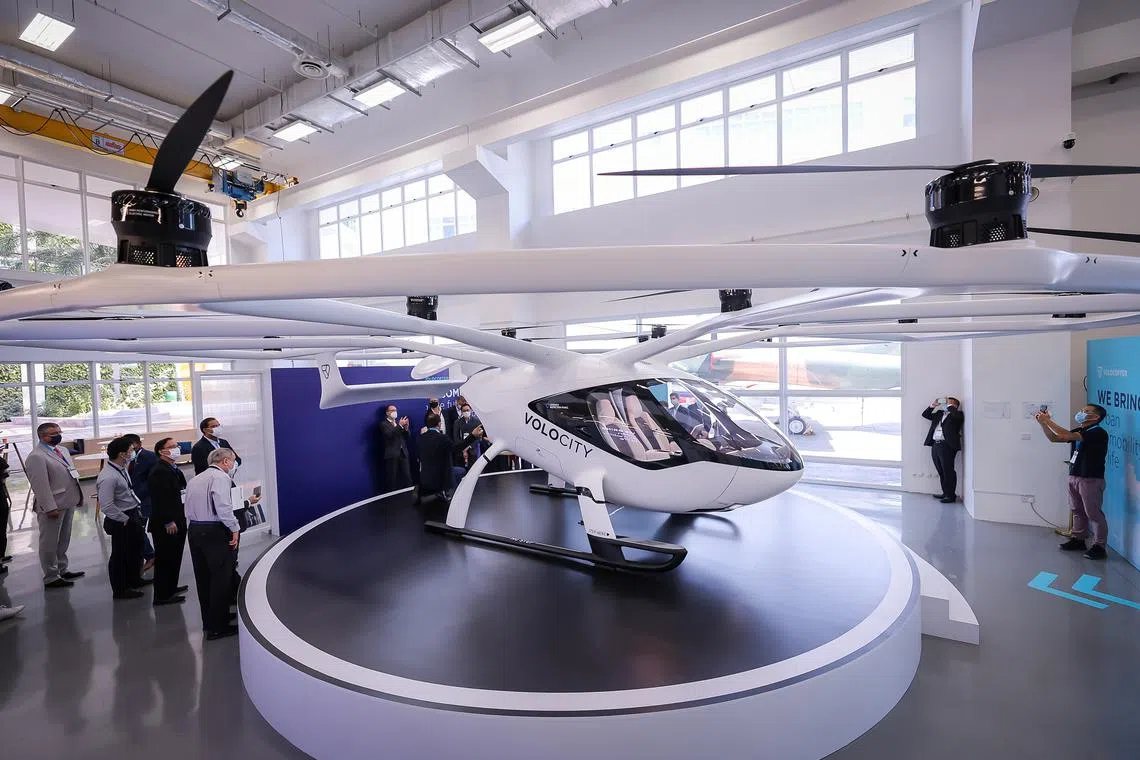Lack of local funding partners forces Volocopter to put air taxi launch in Singapore on hold
Sign up now: Get ST's newsletters delivered to your inbox

Volocopter said it would reconsider its Singapore launch schedule once local funding partners have been found.
PHOTO: ST FILE
Follow topic:
SINGAPORE - The launch of Volocopter’s air taxi operations in Singapore has been put on hold indefinitely, as the pioneer of flying taxis could not secure local partners who can share the burden of funding the technology involved.
Volocopter told The Straits Times: “We are therefore revising our Singapore launch strategy and timeline.
“We will continue to look for local cost-sharing partners and Singapore remains our Asia-Pacific headquarters. Once the partners have been found, we will reconsider the launch timeline in Singapore.”
In 2022, the German company went public with plans to launch a 15-minute air taxi flight in the Marina Bay area
Air taxis are small aircraft that can take off and land vertically, moving passengers across short distances.
In response to queries from ST on Nov 17, Volocopter said that because of economic uncertainties, the company had expected that fund raising would be more challenging globally.
It added that its commercial operations rely on the cooperation of cities where it has plans to launch operations. This requires the adaptation or construction of new infrastructure, route and regulatory planning, and the development of a digital network.
“We are prioritising cities that can accelerate (these) aspects, and adjusting our global business strategy and timeline accordingly,” it said.
Earlier in November, the Civil Aviation Authority of Singapore and its regional counterparts kick-started the development of a framework
Volocopter said that while it has so far netted about €500 million (S$730.6 million) through five fund-raising rounds, it is always looking for ways to finance its air taxi technologies.
The company added that the money it raised is used for its overall operations, including research and development, certification and preparation for its commercial launch.
It could not specify the amount of funds needed to launch air taxi operations in Singapore, saying that different markets have varying situations and partners.
To start commercial air taxi services in Singapore, Volocopter said it would require a complete urban air mobility ecosystem, including aircraft, infrastructure and connectivity.
Transport analysts said the air taxi sector is still new, which may crimp investors’ confidence in its financial viability.
Dr James Wang, director of the Electric Vertical Take-off and Landing Research and Innovation Centre at the Nanyang Technological University, noted that commercial air taxis that carry passengers have not been launched anywhere worldwide, as no aircraft has been certified by internationally recognised aviation authorities.
The European Union Aviation Safety Agency is working on the certification of Volocopter’s air taxis in time for the Paris Olympics, which start in July 2024.
To develop an air taxi company, Dr Wang said it is necessary to secure funding of at least US$1 billion (S$1.34 billion), recruit experienced aircraft designers, and have strong links across the supply chain network.
Besides support from governments, Dr Wang said air taxi companies must secure public support for the benefits of using this transport mode.
He added that there may not be a dire need for air taxis in Singapore because its roads are not as congested as those in neighbouring cities, and the distance from one end to the other is not significant, given the country’s size.
As a result, investors may not see a high return on their investments in Singapore’s air taxi sector, compared with the profits they could earn from cities with greater traffic congestion, said Dr Wang.
Agreeing, transport specialist Terence Fan from the Singapore Management University said sizeable local demand and many daily journeys would be needed to cover the costs of air taxi operations.
Since air taxis can travel only along fixed routes from one vertiport – a pad for aircraft to take off and land vertically – to another, passengers may still have to travel by land to get to their destinations, said Assistant Professor Fan.
But Dr Wang said air taxis could be useful for connecting Singapore to cities nearby.
Volocopter previously laid out longer-term plans for cross-border air taxi operations from Singapore to Indonesia and Malaysia.
Even so, Prof Fan said cross-border air taxi flights are “still full of obstacles” because there are no clear regulatory guidelines for such services.

